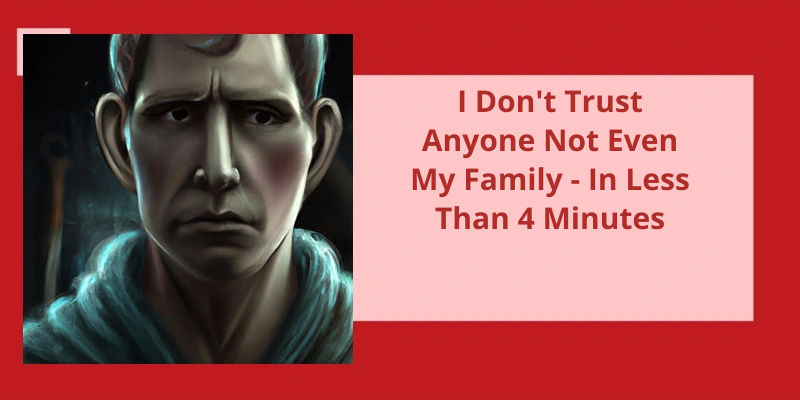I don’t trust anyone – why is that?
It is clear that trust is a complex issue that can be influenced by a variety of factors. Early childhood experiences, social experiences, adult relationships, personality factors, and mental health conditions can all contribute to a lack of trust in other people. It is important to be aware of these factors and to take steps to address them in order to build trust in relationships.
Trust is an essential part of any relationship, and it is important to be aware of the factors that can lead to a lack of trust. Early childhood experiences, social experiences, adult relationships, personality factors, and mental health conditions can all play a role in undermining trust in other people. It is important to be mindful of these factors and to take steps to address them in order to build trust in relationships.
What is the term for a lack of trust in others?
Pistanthrophobia is a serious fear that can have a significant impact on a persons life. It is important to recognize the signs of this fear and to seek help from a licensed marriage and family therapist if needed. With the right support and guidance, it is possible to overcome this fear and build healthy relationships with others.
Pistanthrophobia is a real fear that can be caused by a traumatic experience in a prior relationship. It is important to recognize the signs of this fear and to seek help from a professional if needed. With the right support and guidance, it is possible to overcome this fear and build healthy relationships with others. It is important to remember that trusting others is an important part of life and can lead to positive experiences.
What strategies do you use to cope with an untrustworthy family?
Dealing with toxic family dynamics can be a difficult and emotionally draining experience. However, by setting boundaries, giving yourself permission to leave, being selective about what information you share, and considering talking with a counselor, you can take steps to protect yourself and manage the situation.
Toxic family dynamics can be a difficult and emotionally draining experience, but it is possible to manage the situation. By setting boundaries, giving yourself permission to leave, being selective about what information you share, and considering talking with a counselor, you can take steps to protect yourself and manage the situation. With the right strategies, you can create a healthier and more positive family dynamic.
What percentage of children do not have trust in their parents?
the results of the gallup youth survey demonstrate that the majority of 13- to 17-year-olds feel that they are trusted by their parents or guardians. This is a positive sign that parents are taking the time to build trust with their children and that children are feeling secure in their relationships with their parents.
The Gallup Youth Survey results show that 73% of 13- to 17-year-olds feel that they are trusted by their parents or guardians. This is a positive sign that parents are taking the time to build trust with their children and that children are feeling secure in their relationships with their parents. This is an important step in helping children develop into healthy, well-adjusted adults.
What are the signs that your family is toxic?
It is clear that having a toxic family member can be a difficult and emotionally draining experience. It is important to recognize the signs of a toxic family member, such as their negative perception of you, their accusations, and their ability to make you feel bad about yourself.
It is important to take steps to protect yourself from a toxic family member, such as setting boundaries and seeking support from friends and family. It is also important to remember that you are not alone and that there are resources available to help you cope with the situation.
A child might not trust a parent for what reason?
It is important to be honest with children and to be mindful of their emotional and physical needs. Lying to a child can have long-term consequences, as it can lead to a lack of trust and a feeling of betrayal. Additionally, as children grow older, they become more skeptical and may not believe what their parents tell them. It is important to be honest and to build a trusting relationship with children in order to foster a healthy relationship.
it is essential to be honest with children and to be aware of their emotional and physical needs. Lying to a child can have serious repercussions, as it can lead to a lack of trust and a feeling of betrayal. As children age, they become more skeptical and may not believe what their parents tell them. It is important to be honest and to build a trusting relationship with children in order to ensure a healthy relationship.
What causes trust issues?
Trust issues can be caused by a variety of factors, including low self-esteem, past betrayals, mental health disorders, adverse childhood experiences, and traumatic events. It is important to recognize the signs of trust issues and to seek help if needed.
Trust issues can be difficult to overcome, but with the right support and resources, it is possible to learn to trust again. It is important to be aware of the possible causes of trust issues and to take steps to address them in order to build healthy relationships.
Is mistrusting people a disorder?
Paranoid personality disorder is a serious mental health condition that can have a significant impact on a persons life. It is important to seek professional help if you or someone you know is exhibiting signs of PPD. With the right treatment, people with PPD can learn to manage their symptoms and lead a more fulfilling life.
Paranoid personality disorder is a complex mental health condition that can be difficult to diagnose and treat. It is important to be aware of the signs and symptoms of PPD and to seek help if you or someone you know is exhibiting them. With the right support and treatment, people with PPD can learn to manage their symptoms and lead a more fulfilling life.
What factors contribute to a child developing trust issues?
Trust issues can have a lasting impact on a persons life. They can lead to feelings of insecurity, fear, and anxiety. It is important to recognize the root cause of trust issues and to seek help if needed. With the right support, it is possible to overcome trust issues and build healthy relationships.
Trust issues can be difficult to overcome, but it is possible with the right support. It is important to recognize the root cause of trust issues and to seek help if needed. Understanding the source of trust issues can help to create healthier relationships and a more secure sense of self. With the right support, it is possible to overcome trust issues and build healthy relationships.
I wonder why I am becoming more distant from my family.
Emotional detachment can be a result of traumatic events, such as childhood abuse or neglect. This can be a way for children to cope with the trauma they have experienced, but it can also be detrimental to their emotional development. It is important for parents and caregivers to provide a safe and nurturing environment for children to ensure they can develop healthy emotional connections.
Childhood abuse and neglect can have a lasting impact on a childs emotional development. Emotional detachment can be a way for children to cope with the trauma they have experienced, but it can also be detrimental to their emotional growth. It is essential for parents and caregivers to provide a safe and nurturing environment for children to ensure they can develop healthy emotional connections.
Is it common to not be close to one’s family?
It is important to remember that not all families are close and that it is perfectly normal to not be close to your family. Everyones family dynamic is different and it is important to respect and accept that.
It is important to remember that family relationships are complex and that it is perfectly normal to not be close to your family. It is important to respect and accept the differences in family dynamics and to recognize that everyones family is unique.
Conclusion
In conclusion, it is important to remember that trust is something that must be earned. It is not something that can be given away freely, especially when it comes to family. While family members may have your best interests at heart, it is important to remember that they are still human and can make mistakes. Therefore, it is important to be cautious and not trust anyone, even family, without first taking the time to get to know them and build a trusting relationship.






